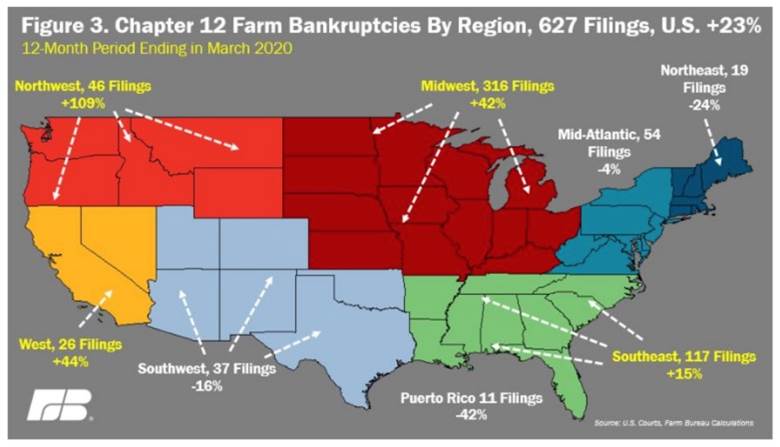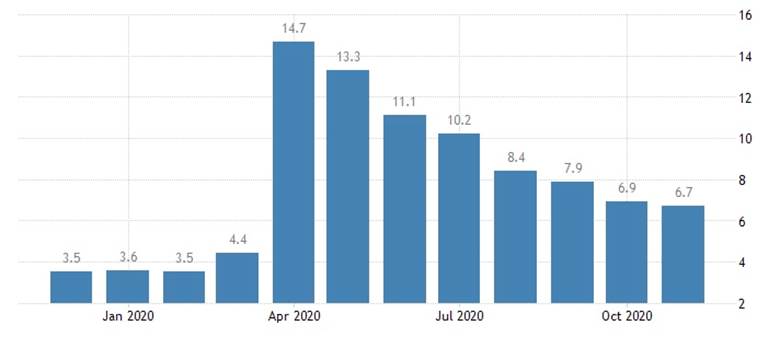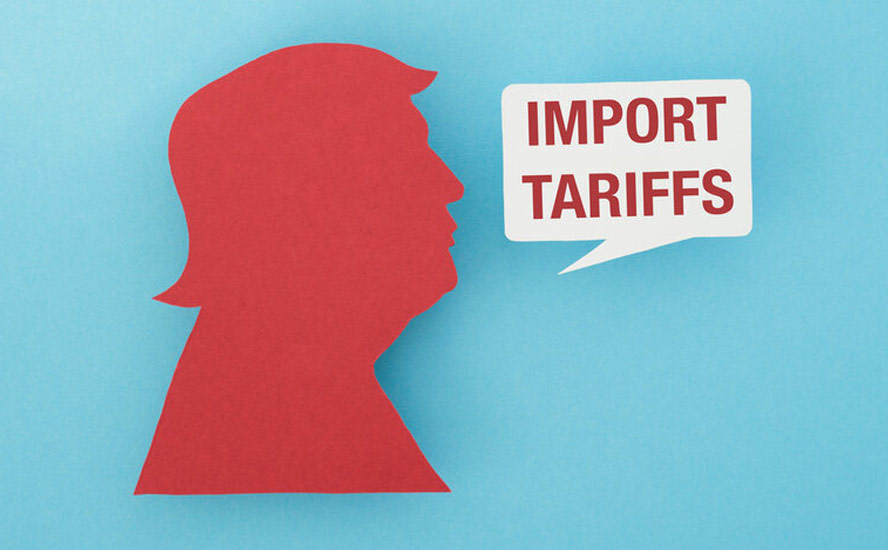US on a knife edge
2020.12.05
A record number of Americans will be having to rely on charity this Christmas season, as the economic situation continues to deteriorate amid an unraveling social fabric made worse by deep political divisions.
The availability of vaccines and drug treatments to fight the covid-19 pandemic is providing hope for millions who have been sideswiped by the virus and its economic fallout, but President-elect Joe Biden faces huge challenges come inauguration day on Jan. 20, 2021, even if vaccines can be rolled out successfully.
Most obvious, are the 74 million Americans who voted for Donald Trump, many of whom continue to believe the soon-to-be-former president’s rhetoric that the election was fixed, and therefore refuse to concede victory to Biden, despite no evidence of vote-rigging and multiple court decisions going against Trump plaintiffs.
The Electoral College meets on Dec. 14 to certify the election winner.
Things keep getting weirder on that front, with the latest being Trump mooting the possibility of holding an alternative event on Inauguration Day, announcing his intention of re-taking the White House in 2024. Trump reportedly is not expected to attend Biden’s inauguration and does not plan to invite Biden to the White House, like former President Obama met with Trump in 2016.
Will Trump continue to sow divisions, behind the scenes, operating a kind of “shadow administration” that will spend four years gunning for Biden? How many of those 74 million Trump supporters will remain loyal to him?
On the other side are the 80 million who cast a ballot for Biden. These folks are by no means united behind the former Vice President. Many “held their nose” and voted for him, especially the progressives who would rather have seen a more left-leaning candidate on the ticket.
As Democrats and Republicans dig in further in opposition to one another, there are internal fractures within both parties. This week, US Attorney General William Barr rejected Republican claims of voter fraud, confirming earlier conclusions of the Department of Homeland Security, US intelligence and independent poll watchers that the Nov. 3 election was “the most secure in American history.”
Meanwhile the issue of race, which metastasized into protests and sometimes violent riots following the police killing of an African-American suspect in Minneapolis, is dogging President-elect Biden. On Tuesday, the Washington Post reported representatives from seven of the country’s leading civil rights organizations want to meet with Biden. They claim he has rolled out a number of lower-level appointments to blacks and Hispanics, but has reserved top-level spots in his Cabinet and the White House for white candidates — prompting concerns that Biden is reneging on promises to promote black leaders to prominent positions.
Emblematic of the country’s political partisanship, the upcoming Senate runoffs in Georgia will determine who has control of the upper Chamber — the Democrats or the GOP. If the latter win just one of two seats up for grabs, the Republicans will keep their majority, effectively kyboshing efforts by the Biden administration to pass legislation they disagree with. If Democratic challengers Jon Ossoff and Rev. Raphael Warnock prevail, the count would change to 50 senators apiece, with tie votes in the Senate broken by Vice President Kamala Harris.
Absent strong leadership, with Trump a lame duck, but seemingly doing everything he can to kneecap a new administration and totally ignoring the pandemic, and President-Elect Biden with only tenuous progressive support within his own party no-one appears to be steering the US ship of state, as it flounders in heavy seas of a second wave of covid cases, business closures and the prospect of millions being cut off of emergency supports come year-end.
If Republicans retain control of the Senate the US has a lame duck Biden presidency for 4 years, his only recourse executive orders and facing bitter internal party accusations over who was to blame regarding why they did so poorly in 2020 down ballot voting.
Continuing inequality and bitter political acrimony between, and within, the two political sides, is making the US look more and more like a country in serious trouble.
Of course central to this discussion is a second coronavirus aid package, which Republicans and Democrats have been quibbling over for months. Nancy Pelosi made a mistake in not accepting Trump’s US$1.8 trillion relief package and now the debate is over Mitch McConnell’s US$500 billion or the non-partisan US$900 billion aid package. Meanwhile tens of millions of Americans face a pretty bleak holiday season as the end of various aid programs threatens to throw millions of Americans under the proverbial bus.
In this article, we walk you through the economic, social and political minefields that threaten to shatter the US recovery and stymie efforts to heal a deeply divided nation.
Record numbers going hungry
When we think of global food insecurity, the United States is not top of mind. At least, it shouldn’t be. In fact, over 50 million American households could be food insecure — ie., lacking access to healthy food — before the end of 2020.
A study by Northwestern University found the pandemic has doubled food insecurity and tripled it among households with children, meaning one in six adults and one in four kids are not eating properly due to economic reasons.
The most alarming representation of these figures are the photos of miles-long lines of cars, three to four wide, waiting at food banks. Of course, hunger didn’t begin with the coronavirus, but it has made it worse. Feeding America estimates 35.2 million people faced hunger last year, compared to 54 million currently. According to the US Census Bureau’s most recent survey, in August about 10% of US adults, or 22.3 million, reported they didn’t have enough food to eat, versus 18 million before the pandemic.
The current throng of unemployed workers, around 20 million who have lost their livelihoods owing to virus-related layoffs/ business closures, also contribute to another problem — food shortages. Less people working means fewer contributions to the needy.
Feeding America, which provides hunger relief and runs over 200 food banks, reportedly could face a deficit of up to 10 billion pounds of food between now and next June, or about 8 billion meals. The Seattle Times reports,
Now, food banks are concerned they won’t be able to provide families with the sustenance they need to survive. Not only has a dramatic nationwide job loss contributed to major shortfalls in food banks, but the number of donations and volunteers have also both been on the decline. A survey that Feeding America conducted in the middle of September revealed that member food banks experienced an average of 56% increase in demand.
Major food assistance programs such as SNAP [Supplemental Nutrition Assistance Program] have also experienced shortfalls during the pandemic, which has put immense pressure on food banks to have the resources to feed millions of Americans.
Farmer bankruptcies soar
The US (and Canadian) food supply is dependent to some extent on the ability of local farmers to meet expected yields. However the news from the American farm belt has not been good. Last year US farm bankruptcies hit an eight-year high, due largely to countervailing duties imposed by China, from the US-China trade war. According to an American Farm Bureau Federation Market Intel report, the number of bankruptcy filings during the 12-month period ending March 2020, was up 23%. These failures are devastating to the owners of family farms who have worked the land for generations. More than 450 farmers killed themselves across nine Midwestern states from 2014 to 2018.

US farm bankruptcies by region. Source: U.S. Courts, Farm Bureau Calculations
Yet the US government seems nonchalant at helping small-scale farmers most vulnerable to swings in commodity prices and sudden fall offs in demand, like happened when virus lockdowns meant food shipments demanded by restaurants dried up. This is concerning.
An NBC News analysis of the first 700,000 payments of federal aid showed corporate farms and foreign-owned corporations received over $1.2 billion in coronavirus relief (about 20% of the money), with average payments of almost $90,000, versus smaller farms who only received an average payment of $300. Those numbers did not account for struggling farmers who were ineligible for assistance.
Great Depression comparison
Despite the economy gaining about half the jobs lost since March, around 20 million Americans remain unemployed. The spike in coronavirus cases over the past two months, accompanied by new restrictions on businesses, has cooled the labor-market recovery. Friday the Labor Department reported a gain of 245,000 jobs in November, down from 610,000 positions added in October. At November’s pace of job growth, employment won’t return to pre-pandemic levels until 2024. According to the Wall Street Journal,
Economists say there are persistent risks of labor-market scarring. Many individuals, facing increased child-care responsibilities or limited job opportunities, have stopped looking for work altogether during the pandemic. The labor-force participation rate, or the share of Americans working or looking for work, was 61.5% in November. That is up from April’s trough, but remains near the lowest level since the 1970s.

US unemployment rate. Source: Tradingeconomics.com; US Bureau of Labor Statistics
In fact, official statistics appear to be under-reporting the number of unemployed. The Government Accountability Office says states are backlogged due to a record volume of applications, resulting in flawed data.
‘Bread lines’ and the huge number of jobless is without a doubt the most disturbing similarities between the coronavirus downturn and the Great Depression.
The economic fallout from covid-19 also includes weak consumer spending, and unprecedented debt levels taken on by states and the federal government, to pay for trillions in aid programs. The country was already suffocating under an unsustainable $23 billion debt pile, before the pandemic hit. It now sits at nearly $27 trillion.
During the Depression there was also a major drop in consumption, along with widespread poverty, hunger and political unrest. Unemployment peaked in 1933 at 25% and remained in the double digits until 1941. Let’s not forget, the 1930’s Depression led to World War Two. The degree of social instability in the United States right now, due to a toxic brew of virus-related business closures/ layoffs, racial tensions bubbling over into destructive protests, left-right animosity rooted in starkly different political ideologies, is eerily similar, and dangerous.
As usual the burden falls most heavily on the poor, who are unlikely to have jobs allowing a “work from home” option, and can ill-afford to buy stuff on Amazon in lieu of shopping at the mall. Add the plight of these individuals to the decreased purchasing power of the average consumer, due to rising food prices, and more expensive imports owing to the billions worth of trade war tariffs still on many of them, and you have a declining standard of living for Joe and Jane Main Street.
The coronavirus has taken a massive toll on the most vulnerable people in US society, ie., the poor, unemployed and minorities. A survey in October found the number of Americans living in poverty rose by 8 million since May.
And it’s about to get worse for them.
Kicked off social supports
At the end of December, cruelly, during Christmas week, about 12 million will lose their unemployment benefits, without an extension to the CARES Act passed earlier this year. Another +4 million will have already run out of their allotted benefits by then. Is the above-mentioned stalemate in Congress going to prevent the passage of a second covid-19 aid package? Lets hope not.
The termination of income supports for more than half of current UI recipients coincides with a lapse in federal protections for renters and a resumption in student loan payments.
As CNBC reports, a federal moratorium on evictions expires at the end of the year. If the Trump administration doesn’t extend it, between 5.5 and 6.5 million people could be evicted by January. According to Zero Hedge, “at least half of households in Arkansas, Florida and Nevada are not current on rent and mortgage payments”.
In August, the Education Department allowed student loan holders to defer their payments until the end of year. Come Jan. 1, those payments are expected to resume. One recent analysis found around 37 million of 42 million Americans with student loans have paused their payments in recent months.
All this is happening amid a second wave of coronavirus cases that is threatening to snuff out the economy’s modest recovery. As covid-19 infections top 14 million and the number of deaths exceed 284,000, states and cities are issuing mask mandates, limiting the size of gatherings, and restricting capacities and hours of bars, stores and other businesses.

Total coronavirus cases in the United States. Source: Worldometers.info

Total coronavirus deaths in the United States. Source: Worldometers.info
The Associated Press quotes data firm Womply, which estimates 21% of small businesses were shuttered at the start of November, up from June’s 16% rate. Womply also said that consumer spending at local businesses declined 30% last month from a year earlier, marking a deterioration from a 20% year-over-year decline in October.
Americans are bracing for the picture to worsen: Thirty per cent of adults surveyed by the Commerce Department from Nov. 11 to 23 reported that they or someone in their household expected to lose income in the next four weeks, up from 23% of those surveyed from Sept. 30 to Oct. 12.
Partisanship & gridlock
As bad as the socio-economic problems are right now in the United States, they pale in comparison to what is happening politically. As a nation, the US is more divided than it has been since the Vietnam War protests of the 1960s. In one corner are Republicans, predominantly white, conservative, religious, defending law and order, and wanting limited immigration. In the opposite corner Democrats are against almost everything the GOP stand for: the goal is inclusivity, defunding the police, righting racial wrongs by electing and appointing more blacks and Hispanics to key positions; multilateralism and globalization abroad; and at home, debt “out the wazoo”. Throwing money at problems is seen not only as a way to help those less fortunate, but to redress social and economic inequality through spending and taxation.
In 2016, Trump campaigned on a promise to treat politics like a business, and get things done. Three years in, we saw the same familiar stalemate between the executive (the president and White House) and legislative (Congress) branches. A government shut-down, spawned by a disagreement between Trump and Congress over border wall funding, was the longest in US history.
Even after 59 people were gunned down in Las Vegas, the government failed to pass gun-control legislation – despite both parties agreeing they should ban “bump stocks” used on one of the Vegas killer’s rifles. When Australia witnessed a shooting massacre in 1996, it banned assault rifles. New Zealand passed gun-law reform less than a month after 50 people were shot and killed in two Christchurch mosques.
The New York Times quoted two Senators saying the institution is basically broken:
“The Senate has literally forgotten how to function. We’re like a high school football team that hasn’t won a game in five years. We’ve forgotten how to win.” – Senator Angus King, Independent of Maine
“Congress is weaker than it has been in decades, the Senate isn’t tackling our great national problems, and this has little to do with who sits in the Oval Office. Both parties — Republicans and Democrats — are obsessed with political survival and incumbency.” – Senator Ben Sasse, Republican of Nebraska
Yet the Senate and the House of Representatives are precisely what needs to work, (as does a Commander in Chief who can unify, not divide) if the United is to survive the next four years intact, as it faces not just the immediate threat of the pandemic, but long-boiling racial tensions that, left unchecked, are about to blow the lid off the pot.
Instead what we have is a political divide wider than the Grand Canyon. As mentioned at the top, Trump has yet to concede, and is apparently gearing up for a re-match with Biden in 2024. NBC News reports,
Trump has recently told some advisers he wants to announce a 2024 campaign shortly after the Electoral College meets on Dec. 14, the people familiar with the discussions said. If he were to announce earlier, he could still hold a campaign-style event or rally on Jan. 20. The Daily Beastfirst reported that Trump might hold a rally on Inauguration Day.
The Trump team has been weighing whether to extend the lease on his 2020 campaign headquarters in Virginia or move the small team that’s left elsewhere, one person familiar with the discussions said.
Already, Trump has raised millions of dollars for his leadership political action committee, “Save America,” which was launched last month as an intermediary vehicle to fund his post-presidency plans…
The president has told aides and allies he is thrilled with the fundraising haul since Election Day and has encouraged the campaign to keep firing off appeals in the coming weeks, according to a person familiar with the discussions.
Trump may have his followers, all 734million of them, but the billionaire real estate tycoon continues to make comments and take positions inappropriate for a sitting president. The latest gaffe showed him expressing support for QAnon, the conspiracy theory claiming that Satan-worshipping pedophiles, including Democratic politicans, run a global sex-trafficking ring that is plotting against the president. (Trump reportedly told a meeting of fellow Republicans that QAnon consists of people who “basically believe in good government.” The room fell silent, not a word said against him — apparently half of Trump’s supporters think top Democrats are involved in child sex-trafficking).
For those familiar with history, QAnon takes their script about Dems straight out of Nazi hate speech regarding Jews, who they claimed worshipped Satan and drank the blood of children.
Meanwhile Biden, who many consider too old to be president, is facing pressures from within his own party to be more progressive and inclusive, even though the former VP beat left-wing Senators Warren and Sanders during the Democratic primaries to stand as a more moderate candidate capable of taking on Trump.
Some Democrats recently elected to Congress are sounding more and more militant in their demands for inclusion, which makes sense, given that blacks and Hispanics have done well in upping their representation over the past couple of election cycles. Results from the Nov. 3 election show 26 black women were elected or re-elected to Congress, a new record. All are Democrats.
In 2019 the most Latinos in history were sworn into the 116th Congress, four Senators and 38 Congressmen/ women. The November election added one more Latino Senator, bringing the total to five, while six more Hispanic candidates won election to the House of Representatives.
Conclusion
When President-elect Biden is installed in the White House in January, he will face the daunting challenge of pulling the US out from under the 1,000-pound gorilla sitting on its chest: covid-19.
Can we expect a rapid economic recovery? The way things are going in the US, which still leads the world in cases and deaths, it doesn’t look good.
Sixteen million jobless Americans will have either lost their unemployment benefits come Jan. 1, or will lose them.
Another 6 million are in danger of being evicted; others are about to re-saddled with student loan payments.
Global growth continues to falter. The IMF estimates the world economy will contract by 4.4% this year.
While hopes are pinned on new vaccines, there are voices warning that even if a successful immunization system is introduced, it won’t be an instant economic panacea. “In terms of actually getting back to pre-Covid or trend growth, it could take more than a year,” said Chris Chapman, a portfolio manager in charge of $660 billion, quoted by Bloomberg.
If the Democrats had won (or win, in January) the Senate, I believe a Biden administration could reach across the aisle and work with Republicans to heal the wounds inflicted over the past four years. The first legislation on the docket, obviously, should be passage of another coronavirus aid package — enough to tide people as vaccines are gradually and safely rolled out.
However if the GOP retains the Senate, I think America is in for a very tough time. Think about it. You’ve got Biden and his team eager to put his stamp on legislation, no matter the cost, which will fly through the House but hit a brick wall of opposition in the Republican-controlled Senate. It’ll be gridlock, all over again. Nothing will get done, and the help, shamefully, may not get through to the people who need it most.
Then there’s Trump, waiting in the wings, to take another crack at the presidency in 2024. Quietly raising funds for a re-match and continuing to tweet/ foment discord at every opportunity.
I’m worried, this is a very dangerous time in the United States.
Richard (Rick) Mills
aheadoftheherd.com
subscribe to my free newsletter
Ahead of the Herd Facebook
Legal Notice / Disclaimer
Ahead of the Herd newsletter, aheadoftheherd.com, hereafter known as AOTH.
Please read the entire Disclaimer carefully before you use this website or read the newsletter. If you do not agree to all the AOTH/Richard Mills Disclaimer, do not access/read this website/newsletter/article, or any of its pages. By reading/using this AOTH/Richard Mills website/newsletter/article, and whether or not you actually read this Disclaimer, you are deemed to have accepted it.
Any AOTH/Richard Mills document is not, and should not be, construed as an offer to sell or the solicitation of an offer to purchase or subscribe for any investment.
AOTH/Richard Mills has based this document on information obtained from sources he believes to be reliable but which has not been independently verified. AOTH/Richard Mills makes no guarantee, representation or warranty and accepts no responsibility or liability as to its accuracy or completeness. Expressions of opinion are those of AOTH/Richard Mills only and are subject to change without notice. AOTH/Richard Mills assumes no warranty, liability or guarantee for the current relevance, correctness or completeness of any information provided within this Report and will not be held liable for the consequence of reliance upon any opinion or statement contained herein or any omission. Furthermore, AOTH/Richard Mills assumes no liability for any direct or indirect loss or damage or, in particular, for lost profit, which you may incur as a result of the use and existence of the information provided within this AOTH/Richard Mills Report.
AOTH/Richard Mills is not a registered broker/financial advisor and does not hold any licenses. These are solely personal thoughts and opinions about finance and/or investments – no information posted on this site is to be considered investment advice or a recommendation to do anything involving finance or money aside from performing your own due diligence and consulting with your personal registered broker/financial advisor. You agree that by reading AOTH/Richard Mills articles, you are acting at your OWN RISK. In no event should AOTH/Richard Mills liable for any direct or indirect trading losses caused by any information contained in AOTH/Richard Mills articles. Information in AOTH/Richard Mills articles is not an offer to sell or a solicitation of an offer to buy any security. AOTH/Richard Mills is not suggesting the transacting of any financial instruments but does suggest consulting your own registered broker/financial advisor with regards to any such transactions
Legal Notice / Disclaimer
Ahead of the Herd newsletter, aheadoftheherd.com, hereafter known as AOTH.Please read the entire Disclaimer carefully before you use this website or read the newsletter. If you do not agree to all the AOTH/Richard Mills Disclaimer, do not access/read this website/newsletter/article, or any of its pages. By reading/using this AOTH/Richard Mills website/newsletter/article, and whether you actually read this Disclaimer, you are deemed to have accepted it.




























